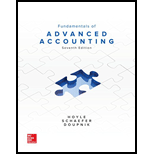
Fundamentals of Advanced Accounting
7th Edition
ISBN: 9781259722639
Author: Joe Ben Hoyle, Thomas Schaefer, Timothy Doupnik
Publisher: McGraw-Hill Education
expand_more
expand_more
format_list_bulleted
Question
Chapter 1, Problem 1Q
To determine
Identify the criteria which determine whether the investor should apply the equity method of accounting to this investment or not.
Expert Solution & Answer
Explanation of Solution
The criteria for determining whether the investor should apply the equity method of accounting to this investment or not is as follows:
- The investor should invest at least 20% or it should acquire at least 20% of the investee’s share.
- The investor should be able to exercise the significant influence over the investee.
If the above two conditions are fulfilled then the organization can use the equity method.
Want to see more full solutions like this?
Subscribe now to access step-by-step solutions to millions of textbook problems written by subject matter experts!
Students have asked these similar questions
Amber Corp. bought $380,000 worth of furniture on July 15, 2014. On November 20, 2014, the company purchased $140,000 of used office equipment. If Amber Corp. Elects Section 179, what is the maximum write-off for these purchases in 2014?
What is the correct answer with accounting question
I want to this question answer for General accounting question not need ai solution
Chapter 1 Solutions
Fundamentals of Advanced Accounting
Ch. 1 - Prob. 1QCh. 1 - 2. What accounting treatments are appropriate for...Ch. 1 - Prob. 3QCh. 1 - 4. Why does the equity method record dividends...Ch. 1 - Prob. 5QCh. 1 - Prob. 6QCh. 1 - Prob. 7QCh. 1 - Prob. 8QCh. 1 - Prob. 9QCh. 1 - 10. During the current year, Davis Company’s...
Ch. 1 - Prob. 11QCh. 1 - Prob. 12QCh. 1 - Prob. 13QCh. 1 - 14. What is the difference between downstream and...Ch. 1 - 15. How is the investor’s share of gross profit on...Ch. 1 - Prob. 16QCh. 1 - 17. What is the fair-value option for reporting...Ch. 1 - 1. When an investor uses the equity method to...Ch. 1 - Prob. 2PCh. 1 - Prob. 3PCh. 1 - Prob. 4PCh. 1 - Prob. 5PCh. 1 - Prob. 6PCh. 1 - Prob. 7PCh. 1 - Prob. 8PCh. 1 - Prob. 9PCh. 1 - 10. Perez, Inc., applies the equity method for its...Ch. 1 - Prob. 11PCh. 1 - 12. Alex, Inc., buys 40 percent of Steinbart...Ch. 1 - Prob. 13PCh. 1 - Prob. 14PCh. 1 - Prob. 15PCh. 1 - Prob. 16PCh. 1 - 17. On January 1, 2018, Alamar Corporation...Ch. 1 - Prob. 18PCh. 1 - Prob. 19PCh. 1 - 20. BuyCo, Inc. holds 25 percent of the...Ch. 1 - Prob. 21PCh. 1 - Prob. 22PCh. 1 - Prob. 23PCh. 1 - Prob. 24PCh. 1 - 25. Matthew, Inc. owns 30 percent of the...Ch. 1 - Prob. 26PCh. 1 - Prob. 27PCh. 1 - 28. Harper, Inc. acquires 40 percent of the...Ch. 1 - Prob. 29PCh. 1 - Prob. 30PCh. 1 - 31. On January 1, 2017, Fisher Corporation...Ch. 1 - Prob. 32PCh. 1 - Prob. 1DYSCh. 1 - Prob. 3DYSCh. 1 - Prob. 4DYSCh. 1 - Prob. 5DYS
Knowledge Booster
Learn more about
Need a deep-dive on the concept behind this application? Look no further. Learn more about this topic, accounting and related others by exploring similar questions and additional content below.Similar questions
arrow_back_ios
SEE MORE QUESTIONS
arrow_forward_ios
Recommended textbooks for you

 AccountingAccountingISBN:9781337272094Author:WARREN, Carl S., Reeve, James M., Duchac, Jonathan E.Publisher:Cengage Learning,
AccountingAccountingISBN:9781337272094Author:WARREN, Carl S., Reeve, James M., Duchac, Jonathan E.Publisher:Cengage Learning, Accounting Information SystemsAccountingISBN:9781337619202Author:Hall, James A.Publisher:Cengage Learning,
Accounting Information SystemsAccountingISBN:9781337619202Author:Hall, James A.Publisher:Cengage Learning, Horngren's Cost Accounting: A Managerial Emphasis...AccountingISBN:9780134475585Author:Srikant M. Datar, Madhav V. RajanPublisher:PEARSON
Horngren's Cost Accounting: A Managerial Emphasis...AccountingISBN:9780134475585Author:Srikant M. Datar, Madhav V. RajanPublisher:PEARSON Intermediate AccountingAccountingISBN:9781259722660Author:J. David Spiceland, Mark W. Nelson, Wayne M ThomasPublisher:McGraw-Hill Education
Intermediate AccountingAccountingISBN:9781259722660Author:J. David Spiceland, Mark W. Nelson, Wayne M ThomasPublisher:McGraw-Hill Education Financial and Managerial AccountingAccountingISBN:9781259726705Author:John J Wild, Ken W. Shaw, Barbara Chiappetta Fundamental Accounting PrinciplesPublisher:McGraw-Hill Education
Financial and Managerial AccountingAccountingISBN:9781259726705Author:John J Wild, Ken W. Shaw, Barbara Chiappetta Fundamental Accounting PrinciplesPublisher:McGraw-Hill Education


Accounting
Accounting
ISBN:9781337272094
Author:WARREN, Carl S., Reeve, James M., Duchac, Jonathan E.
Publisher:Cengage Learning,

Accounting Information Systems
Accounting
ISBN:9781337619202
Author:Hall, James A.
Publisher:Cengage Learning,

Horngren's Cost Accounting: A Managerial Emphasis...
Accounting
ISBN:9780134475585
Author:Srikant M. Datar, Madhav V. Rajan
Publisher:PEARSON

Intermediate Accounting
Accounting
ISBN:9781259722660
Author:J. David Spiceland, Mark W. Nelson, Wayne M Thomas
Publisher:McGraw-Hill Education

Financial and Managerial Accounting
Accounting
ISBN:9781259726705
Author:John J Wild, Ken W. Shaw, Barbara Chiappetta Fundamental Accounting Principles
Publisher:McGraw-Hill Education
Financial leverage explained; Author: The Finance story teller;https://www.youtube.com/watch?v=GESzfA9odgE;License: Standard YouTube License, CC-BY